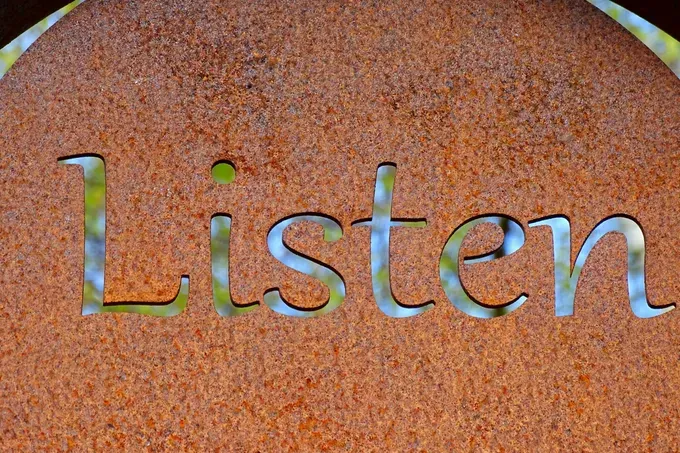Master Active Listening Activities for Personal Success
Personalized Path to Success: Active Listening Tips

In today's fast-paced world, effective communication skills have become more important than ever. Whether it's in our personal relationships or professional endeavours, the ability to actively listen can make a significant difference in achieving success. Active listening is a soft skill that involves giving full attention to the speaker, understanding their message, and responding in a way that shows empathy and understanding. In this blog, we will explore the importance of active listening, its role in different scenarios, and practical tips to improve your active listening skills.
Understanding Active Listening
Active listening is a fundamental skill that goes beyond merely hearing words. It requires focused attention, nonverbal cues, and active engagement. By actively listening, we can better understand the speaker's message, perspectives, and emotions, leading to more effective communication. Good listening skills are essential for building strong relationships, resolving conflicts, and making informed decisions. By honing our active listening skills, we can enhance our communication abilities, improve problem-solving, and foster mutual trust and understanding.
The Foundation of Active Listening
At the core of active listening lies the importance of giving full attention to the speaker. This means putting aside distractions, such as electronic devices or wandering thoughts, and focusing on the conversation at hand. By giving the speaker our undivided attention, we show respect and value their words.
Nonverbal cues play a crucial role in effective communication and active listening. These cues, such as eye contact, facial expressions, and body language, provide additional information about the speaker's message, emotional state, and level of comfort. By paying attention to these nonverbal cues, we can better understand the speaker's intent, emotions, and underlying messages.
Active Listening vs. Passive Listening
Active listening is an intentional and engaged form of listening, while passive listening is a more passive and superficial way of receiving information. While passive listening may suffice in certain situations, active listening is crucial for effective communication and understanding.
By actively listening, we show verbal cues, such as nodding, paraphrasing, and asking clarifying questions, which demonstrate our engagement and understanding of the speaker. These cues encourage the speaker to elaborate, express their thoughts more clearly, and feel valued and heard.
In contrast, passive listening involves minimal engagement, with the listener primarily focusing on receiving information without actively responding or showing understanding. This can hinder effective communication, lead to misunderstandings, and result in missed opportunities for deeper connection and relationship building.
Significance of Active Listening for Solopreneurs

For solopreneurs, active listening skills are of utmost importance. As individuals who often work independently, solopreneurs need effective communication skills to connect with clients, understand their needs, and deliver tailored solutions. Active listening enables solopreneurs to better grasp their clients' perspectives, build trust, and maintain positive relationships.
Additionally, active listening plays a crucial role in skill development for solopreneurs. By listening attentively to feedback, constructive criticism, and customer insights, solopreneurs can continually refine their products, services, and business strategies. Active listening also enhances problem-solving abilities, critical for making informed decisions and adapting to the ever-changing market landscape.
Role of Active Listening in Skill Development
Effective skill development requires active listening. By actively listening to mentors, industry experts, and colleagues, solopreneurs can gain valuable insights, learn best practices, and expand their knowledge base. Active listening nurtures a growth mindset, enabling solopreneurs to continually improve and stay ahead of the curve.
Furthermore, active listening enhances emotional intelligence, a crucial skill for solopreneurs. By understanding and empathizing with clients, solopreneurs can better tailor their products, services, and communication to meet diverse needs. Active listening fosters stronger relationships, builds trust, and promotes collaboration, which are vital for a successful solopreneurial journey.
How Active Listening Enhances Decision Making

Active listening plays a significant role in effective decision-making for solopreneurs. By actively listening to different perspectives, gathering insights, and considering various viewpoints, solopreneurs can make well-informed decisions that take into account the complexities of their business environment.
Active listening fosters better problem-solving skills, as it enables solopreneurs to comprehend the underlying issues, identify potential solutions, and collaborate effectively with stakeholders. By actively listening to clients, customers, and partners, solopreneurs can better understand their needs, uncover hidden opportunities, and adapt their strategies accordingly.
In summary, active listening skills empower solopreneurs with effective communication, better understanding, collaborative problem-solving, and informed decision-making capabilities, all of which are critical for success in solopreneurship and small business ventures.
Core Active Listening Skills to Cultivate

To become effective active listeners, there are several core skills that solopreneurs and individuals can cultivate:
- Non-Judgmental Listening: By suspending judgment, we create a safe space for the speaker to express themselves fully. This promotes open communication, trust, and better understanding.
- Reflective Listening: Reflecting back the speaker's words, feelings, and perspective helps ensure accurate comprehension and shows the speaker that they are being heard and understood.
- Summarizing and Paraphrasing: Summarizing the speaker's main points and paraphrasing their message in our own words demonstrates active engagement and verifies understanding.
- Positive Nonverbal Communication: Using positive body language, facial expressions, eye contact, and gestures conveys attentiveness, interest, and understanding.
- By honing these core active listening skills, solopreneurs can significantly enhance their communication abilities, build stronger relationships, and thrive in their business endeavours.
Non-Judgmental Listening
Non-judgmental listening is a foundational skill of active listening. By suspending judgment and listening without preconceived notions or biases, we create a safe and non-threatening environment for the speaker. This allows them to express themselves fully, share their perspectives openly, and feel valued and respected.
To practice non-judgmental listening, solopreneurs can engage in activities that promote active listening for adults. These activities can include:
- Engaging in active listening exercises with a partner or small group, focusing on listening without interrupting or forming judgments.
- Participating in workshops, seminars, or coaching sessions that provide opportunities for active listening and non-judgmental feedback.
- Incorporating mindfulness techniques, such as deep breathing and meditation, to cultivate a non-judgmental mindset and promote active listening.
- By practicing non-judgmental listening, solopreneurs can foster trust, build stronger relationships, and gain deeper insights into the perspectives of their clients, customers, and business partners.
Reflective Listening
Reflective listening is a powerful active listening technique that involves listening intently to the speaker and then reflecting back their words, feelings, and perspective. It demonstrates active engagement, validates the speaker's thoughts and emotions, and fosters mutual understanding.
To practice reflective listening, solopreneurs can:
- Repeat or paraphrase key points made by the speaker to show understanding and ensure accuracy.
- Use open-ended questions to encourage the speaker to elaborate further on their thoughts and feelings.
- Reflect on the speaker's emotions, acknowledging and empathizing with their experiences.
- By incorporating reflective listening into their communication practices, solopreneurs can create meaningful connections, show empathy, and deepen their understanding of others' perspectives.
Summarizing and Paraphrasing
Summarizing and paraphrasing are essential skills for active listeners. Summarizing involves concisely capturing the main points of the speaker's message, while paraphrasing entails rephrasing the speaker's words in our own words to demonstrate understanding.
To effectively summarize and paraphrase, solopreneurs can:
- Listen attentively to the speaker's message, focusing on the key ideas and main points.
- Take notes or mentally organize the speaker's information to aid in summarizing and paraphrasing.
- Use their own words to restate the speaker's message, ensuring accuracy and understanding.
- By summarizing and paraphrasing, solopreneurs can clarify their understanding of the speaker's message, initiate further discussion, and show active listening.
Positive Non-Verbal Communication
Positive nonverbal behaviour is a vital aspect of active listening. Our body language, facial expressions, eye contact, and gestures can convey receptiveness, understanding, and engagement, further enhancing effective communication.
To engage in positive nonverbal communication, solopreneurs can:
- Maintain eye contact with the speaker, showing focus and attentiveness.
- Use open body language, such as uncrossed arms, to show receptiveness and approachability.
- Nod and smile appropriately, displaying understanding and encouragement.
- Lean forward slightly, indicating interest and active listening.
- By consciously practicing positive nonverbal communication, solopreneurs can create an environment that supports active listening, mutual understanding, and effective communication.
Practical Ways to Improve Your Active Listening Skills

Improving active listening skills is a journey of self-improvement and continuous growth. Here are some practical ways to enhance your active listening skills as a solopreneur:
- Engage in active listening exercises for self-improvement, such as active listening games, role-playing scenarios, or group discussions.
- Seek feedback from trusted colleagues, mentors, or clients to gain insights into your active listening abilities.
- Reflect on your listening skills daily, identifying areas for improvement and setting specific goals for active listening.
- Practice active listening techniques, such as non-judgmental listening, reflective listening, and summarizing, in various personal and professional interactions.
- Invest in active listening training, workshops, or online courses that provide guidance and practice opportunities for skill development.
- By actively engaging in these practical ways, solopreneurs can continually enhance their active listening skills, improve communication effectiveness, and cultivate stronger relationships with clients, customers, and business partners.
Active Listening Exercises for Self-Improvement
Engaging in active listening exercises for self-improvement is an effective way to hone your active listening skills. Here are some exercises you can incorporate into your daily routine:
- Practice mindful listening: Set aside dedicated time each day to focus on a specific sound, such as birds chirping or rain falling, and actively listen without any distractions.
- Record and review conversations: Record important conversations and later review them to analyze your listening skills, paying attention to nonverbal cues, tone of voice, and active engagement.
- Engage in active listening games: Play games that require active listening, such as repeating and summarizing information, in a fun and interactive way.
- Take listening breaks: Dedicate short periods each day to practice active listening, even in mundane activities like listening to a podcast or participating in a group discussion.
- Seek feedback: Ask for feedback from trusted individuals, such as colleagues or mentors, to gain insights into your active listening strengths and areas for improvement.
- By incorporating these active listening exercises into your daily routine, you can enhance your self-training, improve effective listening skills, and become a better active listener.
Role-Play Scenarios for Active Listening

Role-playing scenarios can be effective active listening exercises that provide opportunities for practice, feedback, and skill development. Here are some role-play scenarios for active listening:
- Scenario 1: Simulate a customer complaint with a colleague, taking turns playing the role of the customer and the solopreneur. Actively listen, show empathy, and provide constructive feedback.
- Scenario 2: Role-play a challenging negotiation, focusing on active listening, summarizing key points, and finding mutual understanding.
- Scenario 3: Create an imaginary conversation with different perspectives on a specific topic. Practice active listening and engage in a constructive dialogue to better understand each perspective.
- By engaging in role-play scenarios, solopreneurs can familiarize themselves with different communication contexts, learn effective active listening techniques, and develop stronger communication skills overall.
Advanced Active Listening Techniques

Once solopreneurs have mastered the foundational active listening skills, they can explore advanced techniques to further enhance their communication effectiveness. These techniques involve deeper engagement, understanding of verbal cues, and leveraging active listening for various communication scenarios.
The Art of Asking Open-Ended Questions
Asking open-ended questions is an advanced active listening technique that encourages the speaker to provide more detailed responses, fostering deeper understanding and clearer communication. Open-ended questions cannot be answered with a simple "yes" or "no" and often begin with words like "how," "what," or "why."
By utilizing open-ended questions, solopreneurs can:
- Promote deeper conversation and sharing of perspectives.
- Encourage the speaker to elaborate and provide more information.
- Gain insights into the speaker's thoughts, feelings, and motivations.
The Power of Silence in Active Listening
Silence, when used intentionally, can be a powerful active listening tool. It provides both solopreneur and speaker the opportunity to reflect, process information, and effectively convey their thoughts and emotions.
By embracing moments of silence, solopreneurs can:
- Create a safe space for the speaker to gather their thoughts and express themselves fully.
- Allow for effective nonverbal communication, such as tone of voice and body language, to be better understood.
- Encourage the speaker to continue sharing, knowing they have the solopreneur's full attention and patience.
Overcoming Barriers to Active Listening
Even though active listening is a valuable skill, there are barriers that can hinder effective listening. Identifying and overcoming these barriers allows solopreneurs to become better active listeners and further improve their communication skills.
Dealing with Distractions
Distractions are a common barrier to active listening, especially in today's digital age. To deal with distractions effectively, solopreneurs can:
- Minimize external noise by finding quiet spaces for important conversations or investing in noise-cancelling headphones.
- Set boundaries with technology by turning off notifications, putting devices on silent, or using apps that promote focused attention.
- Practice mindfulness techniques, such as deep breathing or meditation, to refocus attention when distractions arise.
- By actively minimizing distractions, solopreneurs can better concentrate on the speaker's message, show active listening, and avoid misunderstandings.
Coping with Emotional Triggers
Emotional triggers can hinder active listening by clouding judgment, biasing interpretations, and blocking understanding. Solopreneurs can develop effective coping mechanisms to manage emotional triggers, such as:
- Cultivating emotional intelligence through self-awareness and empathy, enables better control over emotional responses.
- Taking deep breaths and mindful pauses to calm the mind, refocus attention, and prevent emotional triggers from influencing active listening.
- Using positive self-talk and affirmations to reframe negative thoughts and remain open-minded during conversations.
- By developing strategies to cope with emotional triggers, solopreneurs can engage in active listening with a clear mindset, better understanding, and effective communication.
Active Listening in Different Scenarios

Active listening is valuable in various scenarios, such as team building, conflict resolution, and collaborative problem-solving. Its effectiveness depends on understanding different perspectives, building trust, and facilitating open communication.
Active Listening for Networking
Active listening is essential for successful networking, as it facilitates meaningful connections, understanding of others' needs, and effective communication. Solopreneurs can apply active listening techniques to networking situations by:
- Engaging in active listening with a second person, focusing on their background, interests, and objectives.
- Asking open-ended questions to show interest and curiosity, fostering deeper conversations and understanding.
- Paraphrasing and summarizing key points made by others to demonstrate listening and comprehension.
Active Listening for Conflict Resolution
Active listening is crucial for conflict resolution, as it allows parties involved to express their perspectives, concerns, and emotional experiences. Solopreneurs can utilize active listening techniques for conflict resolution by:
- Creating a safe and non-judgmental space for each party to speak and be actively listened to.
- Providing constructive feedback that reflects active listening, understanding, and respect for different perspectives.
- Building mutual trust and understanding through active listening, empathy, and effective communication.
Active Listening for Collaborative Problem Solving
Active listening plays a vital role in collaborative problem-solving by fostering effective group discussions, understanding diverse perspectives, and generating innovative solutions. Solopreneurs can employ active listening techniques for collaborative problem-solving by:
- Actively listening to each team member's viewpoints, ideas, and concerns during group discussions.
- Seeking clarification, summarizing ideas, and encouraging active engagement to ensure full understanding of different perspectives.
- Valuing different perspectives, as active listening promotes creativity, synergy, and constructive problem-solving.
Measuring the Impact of Active Listening on Success
Active listening has a profound impact on achieving success, both personal and professional. By building stronger relationships, understanding others, and effectively communicating, solopreneurs can experience increased fulfillment, productivity, and positive outcomes.
Case Studies: Success Stories of Active Listeners
Real-life case studies of active listeners exemplify the transformative power of effective communication skills. These success stories showcase the importance of active listening in various contexts, such as leadership, sales, and personal relationships.
The Connection Between Active Listening and Fulfillment
The connection between active listening and fulfillment underscores the value of good listening skills for personal growth. By actively listening, solopreneurs can foster stronger relationships, better understand the needs of others, and promote mutual trust and collaboration, ultimately leading to greater fulfillment in both personal and professional spheres.
Are you ready to enhance your active listening skills?
Enhancing active listening skills is a powerful way to improve personal and professional relationships, communication effectiveness, and problem-solving abilities. As a solopreneur, becoming a better listener allows you to better connect with clients, understand their needs, and tailor your products or services accordingly for improved business outcomes.
To embark on the journey of enhancing your active listening skills, consider:
- Reflecting on your current listening habits, identifying areas for improvement, and setting specific goals for active listening.
- Taking small steps each day to become a better listener, such as putting away distractions, practicing active engagement, and seeking feedback from trusted individuals.
- Embracing active listening exercises, role-playing scenarios, and advanced techniques discussed earlier in this blog to refine your skills.
- By prioritizing active listening, you can develop into a better listener, foster stronger relationships, and achieve greater success in both your personal and professional endeavours.
What's stopping you from becoming a better listener today?
Becoming a better listener begins with self-awareness and a willingness to step out of your comfort zone. It involves recognizing any barriers or limitations that may be hindering your active listening skills and taking proactive steps to overcome them. So, what's stopping you from becoming a better listener today?
By challenging yourself to listen actively, equipping yourself with effective communication skills, and engaging in continuous learning and practice, you can break through your comfort zone and unleash your full listening potential. Remember, the first word towards becoming a better listener lies within you.
Frequently Asked Questions
Why is active listening important?
Active listening is important because it allows for stronger relationships, effective communication, and mutual understanding. Some reasons for its importance include:
- Building stronger relationships: Active listening fosters trust, deepens connections, and improves communication between individuals.
- Effective communication: By actively listening, we better understand others' perspectives, avoid misunderstandings, and respond appropriately.
- Mutual understanding: Active listening promotes empathy, respect, and a better grasp of others' thoughts, feelings, and experiences.
What skills do active listeners need?
Active listeners require specific skills to effectively engage in active listening, including:
- Good communication skills: Active listeners must be able to express themselves clearly and engage in meaningful conversations.
- Nonverbal cues: Understanding nonverbal cues, such as body language, facial expressions, and tone of voice, enhances communication effectiveness.
- Verbal cues: Active listeners use verbal cues, such as paraphrasing, summarizing, and asking open-ended questions, to show understanding and encourage further conversation.
Conclusion
Active listening is a powerful skill that can greatly impact your personal and professional success. By truly understanding and connecting with others, you can build stronger relationships, make better decisions, and improve your overall communication abilities. Remember, active listening goes beyond simply hearing; it involves being fully present, engaging with empathy, and responding thoughtfully. Practice non-judgmental listening, reflective listening, and summarizing to show others that you genuinely care about what they have to say. Additionally, don't underestimate the power of silence in active listening, as it allows for deeper reflection and understanding. Overcoming distractions and emotional triggers can be challenging, but with dedication and practice, you can become a better listener. Whether it's networking, conflict resolution, or collaborative problem-solving, active listening can make a significant difference in various scenarios. So, are you ready to take the first step towards enhancing your active listening skills? Start today and experience the positive impact it can have on your personal and professional life.
Related Articles
Embracing Matrescence A Journey of Growth and Change
Understanding Your Child's Development: A Simple Guide for New Parents
Citations:

Written with augmented intelligence






































































































































